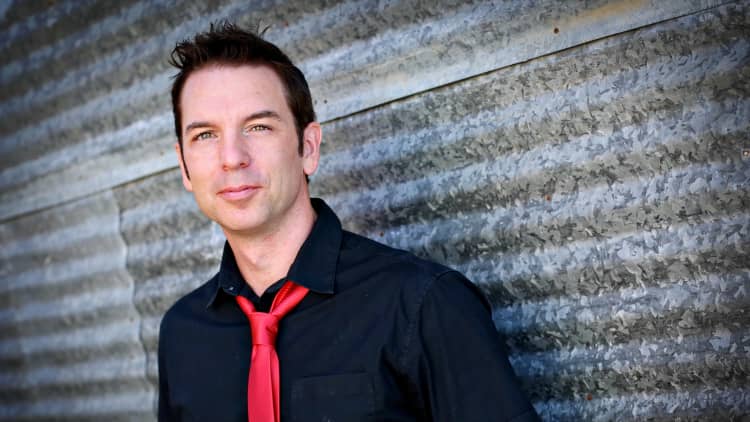Going to graduate school can be great for career advancement but not so good for your bank account. In fact, the average Master of Arts graduate will have $58,539 in student loan debt from undergraduate and graduate school.
That was the case for Robbie Eleazer when he graduated from the Southern California Institute of Architecture (also called SCI-Arc) with $60,000 worth of student loan debt. Though he had enough credentials, Eleazer found himself in another sticky spot upon graduation: He didn't make a lot of money.
Lawyers and doctors could justify paying the high costs of their degrees knowing their earning potential will increase exponentially, but architects, who start in entry-level positions, could find it hard to do so.
More from Student Loan Hero:
How much student loan debt should you take on for grad school?
7 ways paying for grad school is different than paying for undergrad
How are my student loan interest rates decided?
"I was only making $30,000 a year and realized I was in a bad financial situation when I created a rough budget with my salary," says Eleazer. "My rent was $900 a month, and my loan payments were $1,200. But I was only making $2,500, leaving me with about $400 for everything else."
It was then that Eleazer got serious about paying off the debt. Two and half years later, he was debt-free. Oh — and he did it on a $30,000 salary.
5 tips for paying off your student loan debt with a low salary
Here's how the future architect tackled his student loan debt quickly on a small salary — and how you can do the same.
1. Do a cost-benefit analysis
Eleazer's get-out-of-debt plan started before he even incurred the $60,000 bill. He went to a state school for his undergrad education to keep costs down and then analyzed his options for graduate school. He could pay $50,000 a year at Columbia University or $15,000 at SCI-Arc.
"For architecture, [the] salary is based on experience, and where you went to school doesn't matter so much," he says. "You aren't going to get a big salary right out of school. So, I sat down and projected out my salary for the next 10 years next to my debt. It was clear I couldn't afford to go to Columbia. Do the math before you make the student loan decision."
Check out job-hunting websites such as Indeed to research average salaries for your desired profession and use our student loan payment calculator to determine what your monthly loan cost would be versus your income. This cost-benefit analysis can help you decide if the grad school you want to go to is worth it.

2. Get good at budgeting
For a couple of years, Eleazer wasn't going out and having fun in Los Angeles like some of his peers. "I was eating and living very frugally," he says. "My apartment was cheap for LA, I didn't spend money on dinners out, and [I] bought the cheapest version of my necessities."
To make a solid budget, write down your necessary expenses, including rent, student loan payments, food, and utilities. Then, examine your credit card bill and bank statements to see where else your money is going. Ask yourself: Where can you cut back? Can you cancel that cable subscription? Can you find a cheaper apartment? Can you cook at home more?
All these tweaks will add up to big savings, which means you'll have more money to put toward your student loan debt. "It hurt my social life living on an extreme budget," says Eleazer. "But in the long run, I was ahead. I get to live a different lifestyle now being debt-free."
3. Adopt the debt snowball method
Shortly after graduating, Eleazer got exposed to author Dave Ramsey and adopted the debt snowball method he popularized.
"He has easy-to-follow rules," Eleazer says. "List your debts from smallest to highest, regardless of interest. You pay off your smallest first while paying the minimums on the others because it gives you a high. Then, use the money from the small payment and put it toward the next debt until everything is paid off."
Let's say you have student loans with balances of $5,000 and $10,000. Pay off the $5,000 loan first while paying the minimum monthly balance on the $10,000 one. Once you repay the smaller loan, use that monthly payment money to pay down the $10,000 debt. Keep following that pattern until you're debt-free.
You also can look into the debt avalanche method, which focuses on the interest rates of the loans rather than the balance while paying down debt.

4. Take on a side hustle
If you aren't making enough money, you need to figure out how to earn more.
"In addition to my job, I found side work," he says. "Find ways to supplement your income. I worked nights and weekends teaching workshops at UCLA, worked for professors, and spoke at seminars around the world to bring in extra cash."
Eleazer was able to find side gigs that were in his line of work. You can take on a variety of side hustles that don't require a particular background. Become an Uber driver, deliver food for DoorDash, or help someone with some handy work with TaskRabbit.
With Uber, for example, you could make an average of $19.04 an hour, according to the company. Work 20 hours a week and you could make over $1,500 a month. Even if you worked just two hours a day, you could make over $1,050.
5. Put any extra money toward debt
Bringing in extra income through your side hustle is only half the battle. You need to put that money toward your debt.
"I still always lived like I only had that $400 a month," says Eleazer. "All of the money I made from my side hustle, which was about $10,000 to $15,000 a year, went toward paying my student loan debt. Then, I got a $4,000 gift from my grandmother and $2,000 from my now-wife. Every penny went to the debt."
If you get a bonus, tax refund, or birthday money from your mom, resist the urge to spend it on a new pair of shoes. Instead, pretend like you don't have that extra income and put it immediately toward your loans. This effort will help you tackle your debt quickly.
Paying off your student loan debt fast
It can seem daunting to repay your student loans when you're not making much money. But it can be done. Yes, Eleazer made some sacrifices for a few years, but now, he can live a life free of money concerns.
These tips could help you get out of debt without having to worry about bringing home the big bucks. Of course, that would help. If you make more money, you should put it toward paying off your debt before using it for any other type of spending.
"My relationship to money has changed completely," says Eleazer. "I still live by the philosophy to never stop working even when you pay the debt off. It's now a lifestyle choice. I have fun, but spend money differently than other people do."
Don't miss: Kevin O'Leary: Here's the age when you should have your debt paid off
Like this story? Like CNBC Make It on Facebook!


